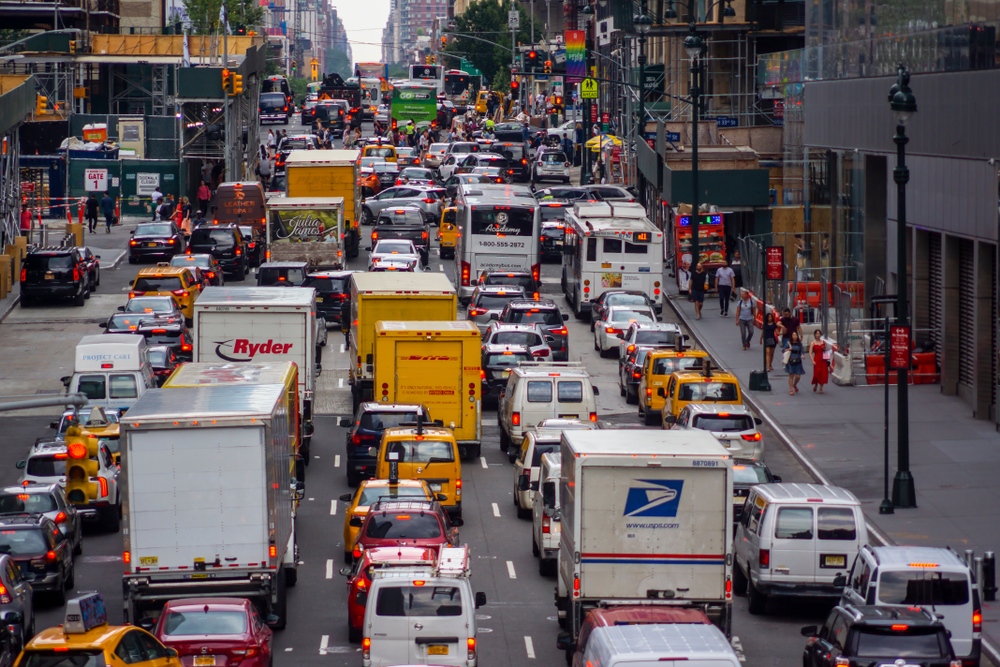The MTA Board’s decision to affirm Gov. Hochul’s pause of New York’s congestion pricing plan was a welcome move that will prevent severe economic disruption throughout not only the five boroughs, but the entire tri-state region.
Supported by a plurality of New York voters across all demographics, including city residents, this decision reflects the Hochul administration’s commitment to keeping consumer costs down amid an ongoing affordability crisis.
The current plan would have undermined the trucking industry’s ability to cost-effectively deliver goods in and out of Manhattan, and ultimately drivers, businesses and consumers would have footed the bill.
Though Hochul’s decision itself was sound, the timing — so close to the intended June 30 congestion pricing plan implementation date — understandably has caused confusion and sparked speculation over the program’s future.
New Yorkers depend on lawmakers to think critically and act intentionally when making public policy, and the upheaval around congestion pricing has highlighted the need for a long-term, holistic strategy to address traffic flow, air quality, transit options, and project prioritization.
The trucking industry, and the businesses and consumers that rely on us would certainly benefit from all of that. Truck drivers navigate city roads to deliver 90% of goods across NYC. Inefficiency costs us all both time and money — not to mention the toll that the stress of navigating traffic takes on their mental health. The city truly is “Nothing Without Trucking.”
The piecemeal approach on this issue limits the trucking industry’s ability to best serve the needs of the city and restricts efficiency throughout the logistics and transportation sectors. But let’s be clear: The delay of a bad plan alone won’t address the issue of congestion.
There are many ways to reduce congestion, but they require a serious commitment to investing in them by lawmakers. Just recently, for example, the “microhubs” initiative in Mayor Adams’ proposed City of Yes for Economic Opportunity zoning reform was stricken from the program. The initiative would have paved the way for citywide traffic reduction by creating centralized delivery hubs for New York’s trucks to have a single-stop location to deliver goods. Once trucks made their deliveries to the microhub, they would be transferred to smaller vehicles, cargo bikes, or even handcarts to make the final delivery.
The pilot program was a pivotal pillar of the Adams administration’s efforts to transform the last mile of deliveries across the city. We stand firmly in support of this idea and are convinced it would enable a more efficient and sustainable freight network, while also building out a more localized workforce.
As the MTA found in a 2017 study, truck traffic is inelastic citywide. In other words, trucks make deliveries when businesses request them. It is also impossible to move heavy freight and everyday consumer goods via the Metro-North, PATH, Long Island Rail Road, D train, or crosstown bus.
Off-hour deliveries, another pillar of the Adams administration’s program that we fully support, will not be activated by discounted off-peak fees because that does little to adjust traffic in the long term, since the off-hour push requires buy-in from businesses many of which, for a variety of reasons, are unable to accept off-hour deliveries.
Centralized delivery hubs are the key to scaling the off-hour delivery program because it eliminates the need for businesses to agree to off-peak deliveries, as trucks could deliver overnight, and last-mile vehicles would then distribute the goods to businesses according to their daily delivery schedule.
The microhubs outlined in the original City of Yes proposal would have actually solved many of the issues congestion pricing pretended to address. They would have made it easier for our industry to self-regulate and to work to reduce congestion and emissions while still ensuring economic success for New York’s small businesses.
Yet, New York City remains too focused on a one-size-fit-all approach that is unlikely to produce the desired outcome, while inflicting intended harm on consumers. There is a pathway to build a safe, sustainable, and efficient freight network in NYC, but it requires a big picture and hard work, not catchy slogans and fancy press releases.
Miller is the director of Metro Region Operations for the Trucking Association of New York.
